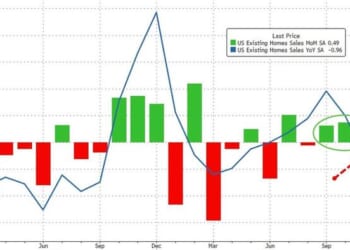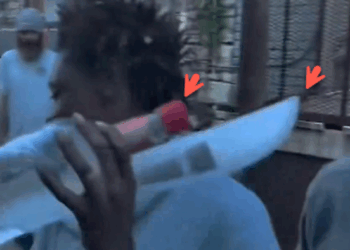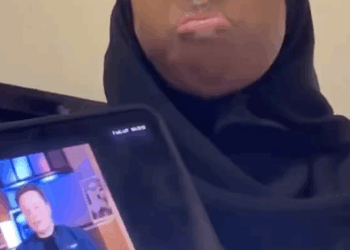Authored by via Paul Birch via The Daily Sceptic,
It’s become an all-too-familiar tale. An individual who, at this stage, is thought to have been known to the police and mental health services, is alleged to have carried out a random, marauding knife attack.
Anthony Williams appeared in court this week charged with 11 counts of attempted murder after multiple stabbings occurred on a Doncaster to London train on Saturday November 1st in an incident which has shocked the nation. The 11th count is for a separate alleged attack against a 14 year-old that took place on the Docklands Light Railway in east London earlier the same day, as we’ve since learnt. Thankfully, at the time of writing, nobody has died as a result of these attacks.
These incidents follow several high-profile cases where men of black African heritage who were known by the authorities to be dangerous have been allowed to roam free in the community, either as a result of clinical decisions or ineptitude, and who have gone on to commit some of the most shocking crimes in modern history.
There was Zephaniah McLeod, who murdered 23 year-old library intern Jacob Billington during unprovoked attacks on eight people in Birmingham in September 2020. McLeod had been released from prison months earlier with no restrictions or supervision, despite experiencing delusions, refusing to take medication and making weapons in his cell.
Pensioner Thomas O’Halloran was killed by Lee Byer in August 2022 while Byer was suffering from ‘demand delusions’ and only five days after his being released from prison.
Valdo Calocane, in June 2023, fatally stabbed students Barnaby Webber and Grace O’Malley-Kumar and caretaker Ian Coates during a rampage on the streets of Nottingham. He had not been forced to take injectable anti-psychotic medication because he “did not like needles”, a report on his care found. In addition, he was allowed to live in the community despite the fact that he had a history of violence, and did not even agree that he was mentally ill.
The most notorious of all is, of course, Axel Rudakubana, responsible for the slaughter of children Alice da Silva Aguiar, Bebe King and Elsie Dot Stancombe at a Taylor Swift-themed dance class in Southport, Liverpool, in July 2024. There had been ample warning signs leading up to the atrocity. Axel Rudakubana first became known to a range of agencies in 2019. He was permanently excluded from school after telling Childline that he was being racially bullied and was bringing a knife into school to protect himself. After his exclusion, he returned to the school and assaulted someone with a hockey stick. Later that same year, Rudakubana again contacted Childline and asked: “What should I do if I want to kill somebody?”
The list could go on, but suffice to say that more people would probably be alive today had it not been for serious failings in Britain’s mental healthcare system, along with other arms of the state. We can be reasonably confident that a lack of funding is a major factor in all of this, and it is cited by many mental health professionals as a factor in the decline of care quality. But with all these disturbed, violent individuals being black, could ‘anti-racist’ sensibilities also be playing a part in these failings?
We know that much of the political class sees the rate at which black people are sectioned as itself a problem. In 2021, the then Conservative health secretary Matt Hancock proposed reforming the Mental Health Act to address the disproportionality in the sectioning of black people compared with their white counterparts, and, in its 2024 manifesto, the Labour Party promised “targeted interventions to reduce the disproportionate detention rates of black individuals under the Mental Health Act”.
When I was a police constable in London, I was involved in the sectioning of a number of people under the Mental Health Act.
On each occasion, it was the informed decision of the duty officer (an inspector) and the officers on the ground that the individual in question posed a physical risk to either themselves or members of the public.
Nearly all were black men, and nearly all were known to mental health services.
Are we now saying that the professional assessments of duty officers, whose primary concern is supposed to be public safety, are to play second fiddle to political considerations? Rather than taking necessary robust action, an inspector today might well be mindful of such absurdities as the Police Race Action Plan, a product of the ideologically captured College of Policing, which asks officers to “consider the levels of disproportionate contact between the police and Black people suffering mental distress”. Certainly, if that inspector were keen on promotion, he or she would at least be hesitant.
I’m sure some will say that to blame ‘woke’ officialdom is a knee-jerk, Right-wing reaction and there’s nothing to see here. So how does one explain the response to one of Rudakubana’s former headteacher’s education plan for him?
Joanne Hodson described Rudakubana as “sinister, cold and calculating”. An unnamed mental health worker challenged this assertion and accused Hodson of racially profiling “a black boy with a knife”.
Hodson told the Southport Inquiry that the accusations succeeded in shutting her up, even though she had a “visceral sense of dread” that Rudakubana was building up to “something”. We will never know what the outcome would have been had she not been silenced.
Mental health outcomes and experiences can vary significantly across different ethnic groups in the United Kingdom. The question of why black people may be more likely to suffer from mental health issues, yet often not be sectioned under the Mental Health Act when they should have been, is an undoubtedly complex one. But progressive dogma should have no place in decision-making where psychotic individuals are concerned. People’s lives depend on it.
Paul Birch is a retired police officer who spent 24 years in the Metropolitan Police, 16 of which in counter-terrorism. You can watch his recent interview with the Sceptic here, and subscribe to his Substack here.
Loading recommendations…


















